Trading Day: ASX higher as Afterpay jumps but miners drag
Stocks closed higher, with Afterpay and Cochlear starring, and ahead of Joe Biden outlining his economic plan.
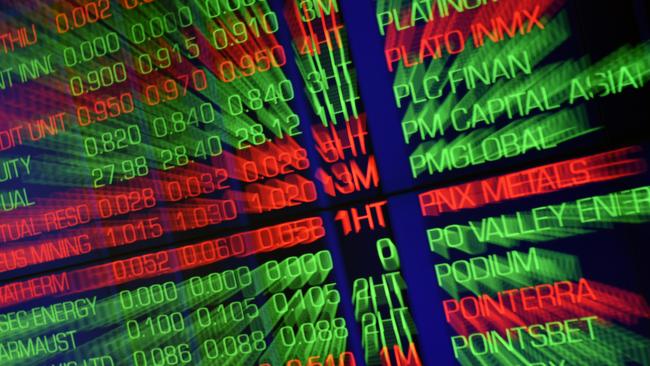
That’s all from the Trading Day blog for Thursday, January 14. The S&P/ASX 200 index rose 0.4pc to 6715.3, its highest close in 4-days, after hitting a 2-day high of 6724.8. Wall Street closed mixed ahead of the Donald Trump impeachment vote. The Dow closed down 0.1 per cent, the S&P 500 up 0.2 per cent and the Nasdaq rising 0.4 per cent.
Cliona O’Down 7.31pm: Australian Ethical FUM pass $5bn
Record net inflows and solid investment returns have pushed Australian Ethical’s funds under management past $5bn for the first time.
Through the December quarter, the investment and super fund manager’s funds under management rose 17 per cent to $5.05bn, with the bulk of the gains coming from its investment performance, backed up by $270m in net inflows.
The fund manager’s shares jumped 11 per cent on the quarterly update before paring gains to be up 3 per cent at $5.68 in afternoon trade.
Over the first half of the financial year, its funds under management jumped 24.6 per cent, with $1.75bn sitting in its managed funds at the end of December compared with the $3.3bn in its super funds.
Australian Ethical CEO John McMurdo said that following the “exceptional momentum” in the first half, the second half of the year would be more challenging.
“While the rest of the year will present some challenges with economic uncertainty and market volatility compounded by the global pandemic, we’re confident that Australians will continue to harness the power of their money for good,” he said.
“Back in 2015, we set the audacious goal of growing funds under management from $1bn to $5bn by 2020. It’s great to have met that target.
“We’re showing what positive action looks like by investing in ethical companies that are driving a more sustainable future while delivering strong returns for our customers.”
David Swan 5.10pm: MS upgrade sends Afterpay shares soaring
Shares in Afterpay soared close to an all-time high on Thursday, buoyed by an upgrade by Morgan Stanley, whose analysts lifting the buy now pay later market darling’s target price from $120 to $136, and declared it has an opportunity to grow its customer base and revenue further in 2021.
In a research note the analysts said Afterpay app downloads had surged in the US and the UK in late 2020, and they expected the active customer base to reach 13.6m active users by the first-half update later this year.
They expect revenue for the half-year period to reach $455m, which is 10 per cent higher than analyst consensus, with further growth to come from the payment platform’s upcoming entry into Europe and potentially Asia.
In the 2022-2023 financial year Morgan Stanley expects revenue to grow by 2-6 per cent as the platform continues to come closer to reaching profitability.
Afterpay investors lapped up the result, sending the company to its highest point for the week, up 9.7 per cent to $121.00.
Morgan Stanley’s price target is now the second-highest of the major research firms, behind Bell Potter’s $140.
Jared Lynch 5.02pm: Whispir AI captures mood of the workforce
Have you received an email or one of those mass corporate text messages from the boss and not opened it? Think again. Companies now have access to a tool that not only monitors open rates but if staff read the message, how long they spent reading it and how engaged they were with the boss’s words of wisdom.
ASX-listed cloud communications provider Whispir has launched a “recipient report” that uses artificial intelligence to provide corporate affairs departments with a list of staff who are most or least engaged.
But rather than be seen as a hi-tech version of Santa’s naughty or nice list, Whispir chief executive Jeromy Wells says the tool is to help businesses craft messages that resonate with staff by giving them greater insights into whether their corporate communications are hitting the mark.
“This is the first outcome of a quite substantial investment we have been making in artificial intelligence and machine learning. It provides a metric that people can then start to refer to … to see how effective your communication was to a particular group of stakeholders,” Mr Wells said.
“You can see what’s working and what’s not working. Not just who received it and who replied. You have a lot of other metrics to provide a blended engagement score.”
The report is part of Whispir’s $9.2m research and development pipeline and has been introduced across some of the company’s biggest customers as part of its core communications platform.
Elise Shaw 4.45pm: US dollar spikes, $A lifts modestly: CBA
Commonwealth Bank’s Global Markets Research notes the US dollar spiked following news President‑elect Joe Biden’s stimulus plan may be much larger than anticipated at $US2 trillion. US 10‑year Treasury yields briefly rose by 4bp towards 1.12%.
“The rally in the USD will be brief and contained in our view because of the deeply negative real US yields. In his discussion about the Fed’s new monetary policy framework, the Fed Vice‑Chair Richard Clarida noted the policy interest rate will not be raised until inflation has been at 2% for one year.”
AUD/USD lifted modestly to around US77.50c.
“The relationship between Australia and China has deteriorated in 2020. The Chinese government has applied restrictions on a growing number of Australian exports. The Chinese trade balance for December showed imports from Australia dropped by 9%/yr. Additional restrictions on Australian exports to China could further ease China’s goods trade deficit with Australia. We expect Chinese demand for iron ore to remain buoyant in the near term. Indeed, elevated iron prices have been a key support to AUD recently.”
4.33pm: ASX ends +0.4% before Biden plan
Australia’s sharemarket rose modestly in mixed trading ahead of keenly awaited US fiscal plans from US President-elect Joe Biden due later Thursday.
The S&P/ASX 200 index rose 0.4pc to 6715.3, its highest close in 4-days, after hitting a 2-day high of 6724.8.
Technology was by far the strongest sector with Afterpay up 10pc to $121 after Morgan Stanley boosted its price target to $136.
The Financials, Real Estate, Health Care, Industrials, Consumer Staples and Utilities sectors also rose.
Among standouts, Westpac rose 2.1pc, Stockland jumped 5pc and Pro Medicus surged 15pc on a contract win.
Materials, Consumer Discretionary, Energy and Communications stocks fell with Fortescue down 1.6pc.
Elise Shaw 4.06pm: Recovering global economy supports Chinese exports: CBA
Commonwealth Bank’s Global Markets Research team notes that China’s international trade report was upbeat in December.
“The global economic recovery and potential additional fiscal stimulus in the US and Japan remain supportive for Chinese exports in the near term. The monthly trade surplus surged to a record high of US$78bn in December. Despite a small fall, export growth remains strong at 18.1%/yr (consensus: 15%/yr). Import growth also beat expectations with an acceleration from 4.5%/yr in November to 6.5%/yr in December.
“The upbeat global economic outlook for 2021 will support Chinese exports in our view. However, in the near term, tighter social distancing measures will weigh on the recovery in some economies. Outside of the UK, the economic impact should be smaller than in Q2 2020 because governments and consumers have adapted. Furthermore, the disruption of social distancing measures has been muted on goods trade. The distribution of vaccines improves the medium‑term global economic outlook. Increasing prospects of another round of stimulus in the US and other economies will also boost demand for Chinese exports. However, the continued CNY appreciation and the continued recovery in developing economies (giving competition to Chinese manufactures) could erode the attractiveness of Chinese exports.
“Expanding domestic demand and recovering foreign demand should support Chinese imports (via re‑exports) in the near term. Overall, we expect Chinese net exports will contribute positively to Chinese economic growth in 2021.”
Elise Shaw 3.35pm: Business airfares at 7-year lows: CommSec
New data shows that domestic airfares have consistently fallen over the six months to January with business fares at 7-year lows, notes Craig James, chief economist at CommSec.
“The Bureau of Infrastructure and Transport Research Economics (BITRE) has issued data on domestic airfares through to January 2021. In smoothed terms (13 month moving average), business class fares fell 5.1 per cent in January to be 12 per cent lower than a year ago.
“Restricted economy fares fell by 1.2 per cent in the month (up 0.5 per cent on the year) with ‘best discount’ fares down 1.4 per cent in the month (up 3.4 per cent on the year).
“Airlines have cut fares to boost patronage but arguably they may need to do more to get people flying again. Still, in smoothed terms, business class fares are at 7-year lows while economy and discount fares are the cheapest in a year.”
Elise Shaw 2.46pm: Macquarie upgrades nickel price forecasts
Macquarie’s Commodities Strategy team has upgraded its FY21 and FY22 nickel price forecasts by 7% and 8% due to an improved demand profile. It forecasts $US7.34/lb and $US7.26/lb respectively.
“A more bullish outlook is now forecast in the medium term with our FY23, FY24 and FY25 price forecasts rising 13%, 10% and 11%, respectively.”
For FY23 it sees the price at $US7.71,/lb, rising to as much as $US8.74/lb by FY26.
“We retain our positive view on the Australian Nickel Miners after incorporating the upgrades to our nickel price forecasts. WSA [Western Areas] and NIC [Nickel Mines] remain our preferred picks of the producers, with MCR [Mincor Resources] preferred over PAN [Panoramic Resources] for development and exploration upside. We remain on research restrictions on IGO [IGO Ltd] and CLQ [Clean TeQ].”
The team said stronger battery demand was a key driver supported by an expected bifurcation between the LME and Nickel Pig Iron markets.
“We continue to expect a strong ramp up in Indonesian Nickel Pig Iron (NPI), in which NIC is a key participant, but expect to see delays in HPAL project.
“We reiterate our Outperform ratings on WSA and NIC, with both stocks offering strong leverage to the buoyant nickel price. MCR remains preferred over PAN for development and exploration upside with timing of the re-start at Savannah still uncertain.
“CHN’s [Chalice Mining] Julimar discovery boasts around ~10% nickel and the upgrades to the nickel price have translated to a modest lift in our price target.”
2.07pm: China exports hit record in 2020
China reported record exports last year, adding steam to the nation’s economy that is expected to be the only major power to report growth in 2020.
China’s exports for 2020 rose 3.6 per cent from a year earlier to a historical high, data from the General Administration of Customs showed.
China’s imports fell 1.1 per cent last year, resulting in an annual trade surplus of $US535.03 billion.
In December, China’s outbound shipment rose 18.1 per cent from a year earlier. That compared with a 21.1 per cent increase in November and the median forecast of a 12.9 per cent rise by economists polled by The Wall Street Journal.
Imports climbed 6.5 per cent last month, better than November’s 4.5 per cent increase and the economists’ expectations of a 5.1 per cent rise.
December’s trade surplus stood at $US78.17 billion, higher than November’s $US75.42 billion and economists’ forecast of $US72 billion.
Dow Jones Newswires
1.41pm: Tesla in US safety recall
US road safety regulators have asked Tesla to recall 158,000 cars in America because of a safety-related defect.
The National Highway Traffic Safety Administration said in a letter to Tesla that a problem with the cars’ display screen and related failures result in loss of rearview camera and other safety-related vehicle functions.
The agency said the defect has been found in certain 2012 through 2018 Tesla Model S cars and 2016 through 2018 Model Xs.

AFP
1.37pm: Biden to unveil economic plan
President-elect Joe Biden is poised to unveil his plan to revive the US economy, as evidence mounts that its recovery from the coronavirus pandemic is flagging despite trillions of dollars in government spending.
With his fellow Democrats narrowly controlling both houses of Congress, Biden appears to have a good shot at passing a third massive rescue package that could include everything from another round of stimulus payments to tax hikes on the rich to an increase in the minimum wage.
“We need more direct relief flowing to families (and) small businesses, including finishing the job of getting people the $US2,000 in relief,” Biden said last week, referring to the last package that provided payments of $US600 in direct payments.
The funds could help revitalise a recovery that appears to be buckling under the weight of the nationwide surge in Covid-19 cases.
The latest government data shows the economy shedding jobs in December and weekly layoffs continuing at a pace above the worst of the 2008-2010 global financial crisis.
AFP
Patrick Commins 1.11pm: China will also suffer: Treasurer
Josh Frydenberg says China has relied on Australian commodity exports to “underpin” its economic growth, suggesting our biggest trading partner’s aggressive trade practices in recent months - including the ban on “high quality” Australian thermal coal - will hurt both nations.
The Treasurer said that the government has made “representations” in regards to the shipfuls of coal sitting outside Chinese ports, and that it was a “challenging” time in the bilateral relationship.
“Australia has been a very reliable, trusted, long term partner for China when it comes to coal exports,” Mr Frydenberg said.
“If that coal is not being able to access the Chinese market, obviously that has an impact more broadly on price, and also China’s ability to access high quality Australian coal.
“Our trade relationship continues strongly in a number of areas. It’s an important relationship both to China and to Australia. Our iron ore from Australia has helped underpin China’s economic growth and we have been a very reliable supplier of not just iron ore but a range of commodities, products and services.”
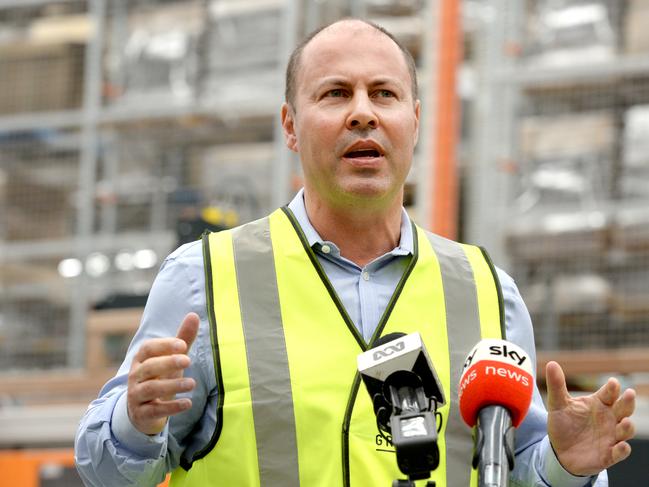
The Treasurer was also questioned on his recent decision to knock back the $300m Chinese bid for Australian-based construction firm, Probuild. China seized on the reports to accuse the Australian government of politicising and “weaponising” the foreign investment process.
Mr Frydenberg again refused to go into specifics on the Probuild decision, but said “over the last six months around 20 per cent of approved foreign investment applications have at least one Chinese party”.
“So that means more than 250 Chinese related foreign investment applications have been approved. Less than a handful have not received it.”
We won’t take your coal, says Beijing
12.05pm: ASX gains as US futures rise
Australia’s share market has turned up slightly in mixed trading, amid gains in US index futures.
The S&P/ASX 200 rose 0.3pc to a 2-day high of 6709.5 as S&P 500 futures rose 0.2pc.
Gains were led by growth, defensive and bond proxy sectors with Tech, HealthCare, Consumer Staples, Utilities, Real Estate and infrastructure stocks outperforming after a pullback in US bond yields.
Afterpay jumped 7pc after Morgan Stanley boosted its target price, while Cochlear rose 3.9pc, Coles rose 0.7pc, APA Group rose 0.9pc, Stockland gained 2.9pc and Transurban gained 1.7pc.
The Materials sector was weakest with BHP down 0.7pc after iron ore prices cooled, while the Communications and Consumer Discretionary sectors also fell after big gains on Wednesday.
China releases monthly trade data at 1pm AEDT, while US President-Elect Joe Biden is due to outline his economic plan later today and Fed officials including Jay Powell are due to speak.
Patrick Commins 11.54am: Borrowers pay government to lend to it - again
Investors have once again proved willing to pay the Australian government for the privilege of lending to it. The Australian Office of Financial Management auction this morning sold Treasury notes expiring in April and July at yields of as low as -0.005.
The “worst” bid (remembering the higher the yield, the lower the price - and the government wants to sell its debt at the highest price) was at a yield of 0.1 per cent, the AOFM said.
Buying the notes at yields below zero would appear to be locking in a guaranteed loss, but experts believe the buyers of notes at negative rates are overseas investors, who make money on their investments via currency swaps.
It’s the second time the AOFM has sold notes at negative rates, after doing so for the first time at its December auction at - in what was called a “watershed” moment.
In December some of the four-month notes sold at -0.01 per cent, while the lowest yield for the longer, six-month notes was 0.01 per cent. This morning’s auction showed negative rates spread out to the longer, July 2021 notes.
The AOFM sold $150m of the notes, split evenly between the tenures. It’s unknown how much was bought at yields below zero, with only the highest and lowest bids revealed. The average yield was 0.0089 per cent for the four-month notes and 0.0134 for the six-month securities.
Cliona O’Dowd 11.22am: Mirrabooka raises after 33pc return
Listed investment company Mirrabooka will raise up to $40m to take advantage of opportunities it sees in the sharemarket after smashing its benchmark with a 33 per cent portfolio return for the six months through December.
Mirrabooka, which is part of the multibillion-dollar stable of listed investment companies that includes the nation’s largest LIC, Australian Foundation Investment Co, or AFIC, on Thursday told shareholders its portfolio had benefited from strong gains in some of its larger holdings including Mainfreight, ARB Corp, Objective Corp, Reece, Net Wealth, HUB24 and Xero.
“Despite the overall strength in the market, we have found opportunities to invest in some new companies for the portfolio,” it said in an update to the market.
Additions over the six months included NIB, Nanosonics and Superloop as well as Corporate Travel, which it previously owned and sold off.
“We decided to re-enter the stock as it very effectively navigated the impacts of the crisis and made a well-timed acquisition in the US,” Mirrabooka said of its move back into Corporate Travel.
David Swan 11.17am: GetSwift finds new ‘home’ in Canada
GetSwift has successfully listed on minor Canadian exchange NEO, fending off an Australian Federal Court challenge and a rare intervention from Treasurer Josh Frydenberg to begin trading to Canadian investors.
The last-mile logistics software provider, founded by AFL player Joel MacDonald, is still facing an ongoing class action suit in Australia but this month received court approval to redomicile in Canada.
GetSwift chief executive Bane Hunter said in September the move complemented the company’s growing exposure to the North American market.
GSW is up 4.48 per cent in its first day on the NEO, trading at $2.10 giving it a valuation of $CAD61.8m ($A62.83m).
“We are thrilled and honoured to partner with the NEO Exchange and list GetSwift in Toronto, finding a home in the same time zone as our New York headquarters and in close proximity to our expanding client base across the Americas,” GetSwift chief executive Bane Hunter said in a statement.
NEO President and CEO Jos Schmitt said, “GetSwift’s decision to list on NEO aligns well with the evolution of their business and client base. It’s also a testament to the innovative solutions NEO has developed to provide our listing partners with increased access to capital and enhanced visibility with the investor community around the world. We are honoured to be GetSwift’s exchange of choice as they set their sights on rapid and continued expansion.”
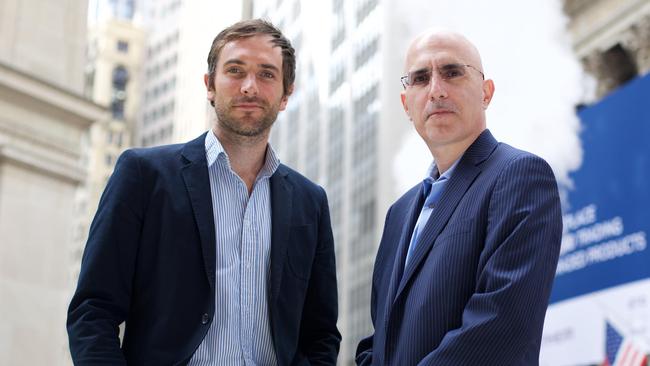
10.41am: Industrials sector upgraded: MS
Morgan Stanley’s Andrew Scott has upgraded the Industrials sector to in-line after upgrading Boral and Incitec Pivot to Overweight, while cutting Adbri and Pact Group to Underweight and Orora to Equalweight.
For the building materials sector, he sees affordability, stimulus and a change in consumer preferences and the continuation of a low rate environment maintaining housing momentum in all key markets.
Infrastructure-focused stimulus is expected to contribute in Australia and to begin to gather momentum in the US.
He keeps a preference for James Hardie for quality and share growth, Fletcher Building on valuation and earnings upside risks, and has upgraded Boral given end market momentum, asset sale potential and likely cost cutting.
In Agriculture, he upgraded Incitec as end markets show renewed strength providing momentum into 2021, and favourable domestic rainfall, attractive valuation and positive trends in key fertiliser prices should help.
Mr Scott sees recent weather trends and potential progress on Omega-3 development helping the company.
In packaging he likes Amcor for its quality and defensiveness with high single digit or low double digit growth, 4pc yield at attractive forward PE multiple of 16 times multiple.
Orora offers a similar yield and upside from turnaround in the North America segment, but wine volume concerns prompted his downgrade.
Pact is least preferred as it trades above his target, with further proof on the turnaround required to unlock further upside.
For Sims and BlueScope, while steel and scrap prices have rallied strongly since mid 2020, he’s reluctant to extrapolate these levels.
10.25am: ASX flat in mixed trading
Australia’s share market eased to be relatively flat in mixed trading early on Thursday.
The S&P/ASX 200 has been confined to a tight range of 6675.5-6692.7 after rising 0.2pc to 6686.6 on Wednesday.
Tech, Real Estate, Health Care, Utilities and Consumer Staples rose amid a switch back to growth, defensives and bond proxies as bond yields fell.
Financials and Industrials are also up with Westpac up 1pc and Transurban up 1.6pc.
Afterpay is the biggest contributor to strength, up 4.5pc after Morgan Stanley boosted its price target to $136.
But value stocks in the Energy, Materials and Consumer Discretionary sectors have struggled after similar moves in the US market as bond yields fell.
Iron ore miners are the biggest drags with BHP down 0.8pc, Fortescue down 2.2pc and Rio Tinto down 1.5pc as iron ore prices slipped.
Gold and copper miners are the biggest losers today with Resolute down 3.5pc and OZ Minerals down 3.4pc.
Lachlan Moffet Gray 10.12am: Afterpay success recognised
Analysts at Morgan Stanley have upgraded Afterpay’s target price to $136 from $120, stating the flagship buy now pay later business has the opportunity to grow its customer base and revenue further in 2021.
In a research note the analysts said Afterpay app downloads had surged in the US and the UK in late 2020, and they expected the active customer base to reach 13.6m active users by the first half update later this year.
They expect revenue for the half year period to reach $455m, which is 10 per cent higher than analyst consensus, with further growth to come from the payment platform’s upcoming entry into Europe and potentially Asia.
In the 2022-2023 financial year the analysts expect revenue to grow by two to six per cent as the platform continues to come closer to reaching profitability.
Morgan Stanley’s price target is now the second-highest of the major research firms, behind Bell Potter’s $140.
Consensus is $104.69 while UBS maintains the lowest price target at $30 per share.
Afterpay last traded at $110.26 per share.
9.44am: Shares likely flat in mixed trade
Australia’s share market is likely to be flat in mixed trading Thursday.
However, there may be a switch back to bond proxies, defensives and growth, while Materials, Energy and Financials may struggle, based on US leads.
BHP ADR’s equivalent closed at $45.95 points to a 0.6pc fall in the Materials sector heavyweight, while the KBW Bank index in the US fell 0.5pc.
Commodities were mixed with spot iron ore down 1.5pc, Brent crude down 1.1pc, spot gold down 0.5pc and LME copper up 0.4pc.
While bond yields remain high compared to the past 12 months, the US 10-year yield has retreated sharply from a 10-month high of a 1.855pc to a 4-day low of 1.0713pc in the past two days.
US 10-year yields closed down 4bps at 1.0832pc after benign CPI data and reassuring comments on monetary policy from the Fed’s Lael Brainard.
The bond market’s reaction to Joe Biden’s economic plan as well as Fed speakers including Jay Powell later Thursday may drive the share market to some extent.
David Ross 9.27am: Australian Ethical funds surge
Australian Ethical has seen funds under management balloon beyond $5bn, up from 4.32bn in the September quarter.
The 16.9 per cent growth for the December quarter comes after a 24.6 per cent boost in the financial year.
The ASX-listed funds manager saw the growth after record net inflows and strong performance from investments.
Unlike many funds managers, Australian Ethical has not benefited from the meteoric rise of buy-now-pay-later providers, which have driven recent astronomical price gains on the market.
Market darlings like Afterpay do not meet Australian Ethical’s investment standards.
Australian Ethical’s Emerging Companies Fund delivered a 35.9 per cent return in the 2020 calendar year. Its Australian Shares Fund saw 21 per cent returns.
The funds manager, which launched in 1994, has seen a recent burst in activity after setting a goal of $1bn in funds under management by 2015.
Australian Ethical CEO John McMurdo said the results demonstrated the returns that were possible from a responsible investment strategy.
Despite a recent rise to $5.52, shares in the funds are still trading below their mid-year peak in Jun of $9.
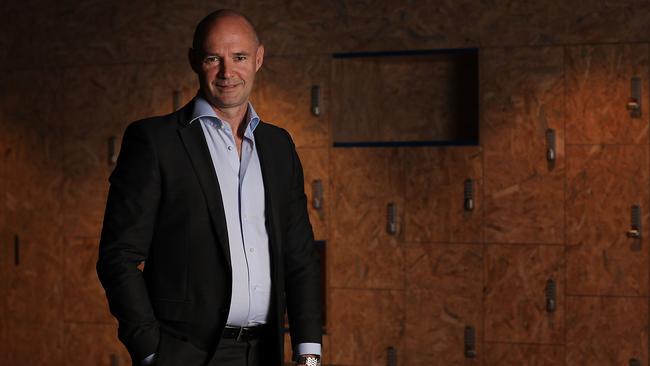
Lachlan Moffet Gray 9.02am: More losses for Ampol’s Lytton
Petrol retailer and refiner Ampol says the beleaguered Lytton refinery’s replacement cost of sales operating profit basis (RCOP) EBIT amounted to a loss of $4m in the fourth quarter of 2020.
It brings the refinery’s full year loss to $145m, which is $20m below analyst forecasts, but which still highlights why Ampol has been considering closing the Brisbane facility, one of the last remaining refineries in the country.
Total refinery production throughout the fourth quarter was 1369ML, bringing annual production to 3496ML.
The facility was assisted by a low cost of crude oil throughout the quarter, supporting higher margins. The company said a comprehensive review into the future of the refinery’s operating model is due to be completed in the first half of 2021
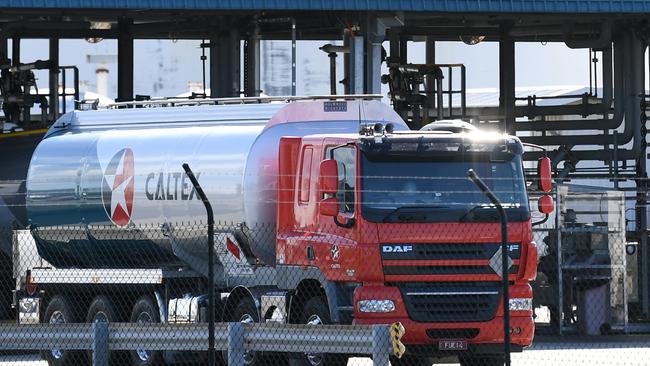
9.00am: India rebound helps lift Whitehaven production
Whitehaven Coal said it produced 29pc more coal in its second fiscal quarter compared with a year ago as it reported rising demand from Indian buyers, particularly for coal used to make steel.
The coal miner said it produced 3.9 million metric tonnes of saleable coal in the three months through December versus the same period a year earlier. That took first-half output to 8.8 million tonnes, up 13pc on-year.
Whitehaven said total managed coal sales were up 2pc during the second quarter from a year ago at 4.5 million tonnes.
The company said Indian demand for coal has rebounded strongly since pandemic-related restrictions slowed its steel industry in mid-2020. “It continues to be a growing destination for Whitehaven’s metallurgical coal products,” the miner said.
Demand has also improved in other key markets including Japan, Korea and Vietnam and Whitehaven expects sales volumes in 2021 to return to pre-pandemic levels, the miner said.
Still, prices for Australian steelmaking coal remain weak amid after China placed import restrictions on coal from the country, said Whitehaven.
Prices for thermal coal--which also faces restrictions in China--have managed to rise from 2020 lows because of supply cuts and increased energy demand across Asia, it said.
“China’s restrictions have altered seaborne coal trade flows where, instead of being delivered to China, Australian coal is now finding customers in alternate destinations including India, Pakistan and the Middle East, and traded coal historically delivered into these markets is finding its way into China,” Whitehaven said.
Dow Jones Newswires
8.46am: What’s impressing analysts today?
Adbri cut to Underweight: MS
Boral raised to Overweight: MS
Incitec raised to Overweight: MS
Mincor target price raised 17pc to $1.40: Macquarie
Orora cut to Equal-Weight: MS
Pact Group cut to Underweight: MS
Panoramic price target raised 23pc to $0.16: Macquarie
Premier Investments target price raised 17pc to $20.80: Sell rating kept: GS
Premier Investments cut to Neutral; target price raised 20pc to $24.50: UBS
Pro Medicus cut to Sector Perform: RBC
Rio Tinto PLC cut to Hold: DB
Sims Group target price raised 41pc to $16.40: Outperform rating kept: Macquarie
Transurban raised to Hold: Morningstar
Tyro Payments target price cut 14pc to $3.15; Neutral rating kept: GS
Altium target price raised cut 12pc to $32.20: Neutral rating kept: Citi
Dalrymple Bay started at Buy: $2.42 target price: Citi
Premier Investments target price raised 21pc to $25; Neutral rating kept: Citi
Afterpay target price raised 13pc to $1.36; Overweight rating kept: MS
8.40am: Rio Tinto delays NZ smelter exit to 2024
Rio Tinto has reached a new electricity agreement with Meridian Energy that will keep New Zealand’s Tiwai Point aluminium smelter open until December 2024.
The deal delays the likely closure of the smelter, New Zealand’s largest single user of electricity, for at least three years.
The smelter is a joint venture between Rio Tinto (79.36pc) and Sumitomo Chemical Company.
The fate of the smelter has been uncertain since Rio Tinto in 2019 threatened closure by late 2021, saying it needed tens of millions of dollars of relief from transmission costs and electricity prices.
“The extension provides certainty to employees, the local community and customers while providing more time for all stakeholders to plan for the future,” Rio Tinto said on Wednesday.
It said while talks with the New Zealand government were continuing over high power transmission costs, the new agreement made the smelter economically viable and competitive over the next four years.
Meanwhile plans for the eventual closure of the smelter would continue.
Rio Tinto Aluminium chief executive Alf Barrios said: “This agreement improves Tiwai Point’s competitive position and secures the extension of operation to December 2024. It also provides Rio Tinto, the New Zealand government, Meridian, and the Southland community more time to plan for the future and importantly gives our hard-working team at Tiwai and
our customers the certainty they deserve.”
The smelter employs around 1000 people directly and creates a further 1600 indirect jobs in Southland.
8.26am: ASX tipped to edge up at open
Australian stocks are poised to edge higher in early trade, after Wall Street wavered ahead of a US impeachment vote.
Shortly after 8am (AEDT) the SPI futures index was up 7 points, or 0.1 per cent.
Yesterday, the sharemarket closed flat, rebounding from a 4-day low as US futures edged up after supportive comments from Fed officials and a strong Treasury auction calmed the bond market.
The Australian dollar is lower at US77.44c.
Brent oil is down 0.9 per cent at $US56.06 a barrel, while spot iron ore is 1.4 per cent lower at $US169.00 a tonne.
Cameron Stewart 8.23am: Trump impeached for second time
Donald Trump has become the first president to be impeached twice after the House of Representatives voted that he committed high crimes and misdemeanours for an ‘incitement of insurrection.’
The House voted to impeach the president for his role in inciting the storming of the Capitol Building in which five people died.
Nine Republicans broke ranks to vote to impeach Mr Trump.
There have now been four presidential impeachments - Andrew Johnson in 1868, Bill Clinton in 1998 and Mr Trump in both 2019 and 2021.
Democrat House Speaker Nancy Pelosi declared Donald Trump was a ‘clear and present danger” to America as she opened the impeachment debate.
8.10am: Mixed session on Wall Street
US stocks closed mixed ahead of a vote by lawmakers on impeaching President Trump during his final week in office.
The S&P 500 ticked up 0.2pc, though the Dow Jones Industrial Average pared gains and slipped less than 0.1pc by the close of trading. The Nasdaq Composite rose 0.4pc.
House lawmakers were to vote on impeaching the president for the second time, just days before he is due to leave office. While the political rancour has weighed on market sentiment in recent days, most money managers are looking past the developments in Washington to focus on the prospects for additional fiscal stimulus.
“The market is largely focusing on the fundamentals around a Biden administration,” said Willem Sels, global chief investment officer at HSBC Private Banking.
Stocks have drifted lower this week after notching record highs in early January as investors weighed the prospect of fresh government spending against political turmoil in Washington and still rising Covid-19 cases. Energy and banking are among the best performers so far in the new year as investors bet on companies that fared poorly in 2020 and are likely to benefit as the economy recovers.
“Markets are going to remain choppy for a while, but through it all, we remain cautiously optimistic,” said Altaf Kassam, head of investment strategy for State Street Global Advisors in Europe. “The amount of fiscal stimulus that is possible will protect risky assets, and there is still a lot of cash on the sidelines.”
In addition to looking at the prospects for additional stimulus, some money managers are keeping an eye on the incoming administration’s rollout of the vaccine.
The Federal Reserve’s beige book report also came out, offering the latest collection of business anecdotes with insights into how companies view the economy’s prospects. The U.S. economy grew modestly in the final weeks of 2020, said the Federal Reserve report, which indicated declines in retail sales and demand for hospitality and leisure services in some parts of the country.
In corporate news, shares of Intel gained 7.7pc as the chip giant said it ousted Chief Executive Bob Swan after activist hedge fund Third Point urged sweeping changes at the company.
General Motors rose 2.5pc after the auto maker said it was launching a new electric-truck business.
Dow Jones
8.10am: Citigroup overhauls wealth businesses
Citigroup is restructuring its businesses that manage money for wealthy customers, one of the first big moves by incoming chief executive Jane Fraser to put her stamp on the bank.
The New York bank is combining into a new unit its high-end private bank for the ultra rich and its wealth-management offerings for the less affluent, Ms. Fraser and outgoing CEO Michael Corbat said in a memo to employees.
Until now, Citigroup’s private bank -- which serves clients with more than $US25 million in assets -- was run by the bank’s institutional clients group. The consumer wealth operations, including the CitiGold brand, were managed by the retail bank. Those offerings, which require a minimum balance of $US50,000 in Citigroup accounts, generally served customers with up to $US10 million in assets.
By creating a unified Citi Global Wealth business, the bank’s executives are trying to serve customers along the entire spectrum. The idea is for the bank to get clients earlier and keep them as they grow richer, earning more fees in the process.

Dow Jones
7.55am: Fed report shows mixed picture of US recovery
Some segments of the US economy showed promising signs of rebounding from pandemic damage, but the picture remains decidedly mixed amid the uptick in Covid-19 infections, according to a Federal Reserve report.
Most regions of the country reported “economic activity increased modestly,” and employment rose albeit slowly, as housing sales remained strong and manufacturing stayed on an upward trajectory, the central bank said in its “beige book” survey of economic conditions.
The world’s largest economy posted a record economic collapse of 31.4 per cent in the April-June quarter of 2020 as businesses nationwide were forced to shut down and trade collapsed.
Activity bounced back later in the year as firms adjusted to new protocols and infections were brought under control, but that progress was threatened in the Fall when Covid-19 cases surged again, pushing the single-day death toll to over 4,000.
AFP
6.50am: Airbnb, Google move to curb inauguration violence
Airbnb and Google unveiled steps aimed at heading off attacks on US democracy as inauguration day neared for President-elect Joe Biden.
The leading home-sharing platform put out word it is banning bookings in Washington around the time of Biden’s January 20 inauguration after local authorities asked people to stay away following the attack on the US Capitol.
“We are announcing that Airbnb will cancel reservations in the Washington, DC metro area during the inauguration week” and stop any new bookings, the company said in a statement.
Google joined the effort to curb new attacks, confirming it is temporarily halting political ads on its platform starting Thursday and at least until the day after Biden is inaugurated.
AFP
6.15am: US stocks edge up ahead of impeachment vote
Wall Street wavered ahead of a vote by lawmakers on impeaching President Trump during his final week in office.
In early afternoon trade the S&P 500 ticked up 0.5 per cent, while the Dow Jones Industrial ticked rose 0.2 per cent. The Nasdaq Composite rose 0.6.
House lawmakers plan to vote today on impeaching the president for the second time, just days before he is due to leave office. While the political rancour has weighed on market sentiment in recent days, most money managers are looking past the developments in Washington to focus on the prospects for additional fiscal stimulus.
“The market is largely focusing on the fundamentals around a Biden administration,” said Willem Sels, global chief investment officer at HSBC Private Banking.
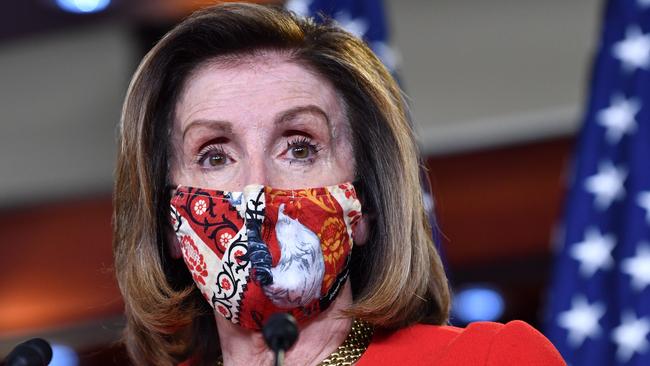
Stocks have drifted lower this week after notching record highs in early January as investors weighed the prospect of fresh government spending against political turmoil in Washington and still rising COVID-19 cases. Energy and banking are among the best performers so far in the new year as investors bet on companies that fared poorly in 2020 and are likely to benefit as the economy recovers.
“Markets are going to remain choppy for a while, but through it all, we remain cautiously optimistic,” said Altaf Kassam, head of investment strategy for State Street Global Advisors in Europe. “The amount of fiscal stimulus that is possible will protect risky assets, and there is still a lot of cash on the sidelines.”
In addition to looking at the prospects for additional stimulus, some money managers are keeping an eye on the incoming administration’s rollout of the vaccine.
US inflation data showed that consumer prices increased only moderately last month, reflecting weak demand for a range of goods and services. Some economists expect inflation to pick up the pace as the economy grows faster later this year.
“The inflation picture is going to look different 6 months from now,” said Andrew Mies, chief investment officer at 6 Meridian. “You’re likely going to see higher levels of inflation.”
Overseas, the Stoxx Europe 600 added 0.1 per cent. Among major European equities, French retailer Carrefour jumped 13 per cent after saying it was in talks with Canada’s Alimentation Couche Tard over a potential merger.
In Asia, major indexes ended the day mixed. Japan’s Nikkei 225 rose 1 per cent, and South Korea’s Kospi gained 0.7 per cent. The Shanghai Composite fell 0.3 per cent.
Dow Jones Newswires
6.12am: Gold prices settle near one-week high
Futures for gold finished solidly higher after a report on US inflation and as investors responded to a House vote on impeaching President Donald Trump, for a second time, days before he is set to relinquish power to President-elect Joe Biden on January 20.
February gold prices traded $US10.70, or 0.6pc, higher to settle at $US1,854.90 an ounce, after settling 0.4pc lower yesterday.
The settlement for gold marks its highest level since January 7, FactSet data show.
Dow Jones
6.10am: Markets eye historic impeachment bid
World markets were steady and the US dollar rose against other major currencies, with traders on edge ahead of a likely historic second impeachment of US President Donald Trump, dealers said.
Sentiment was capped also by worries about surging COVID-19 infections, which has caused several countries to reimpose lockdowns as they battle to roll out vaccines.
London closed down 0.1 per cent, Frankfurt rose 0.1 per cent and Paris edges up 0.2 per cent.
On Wall Street, the Dow was flat in midday trading.
Shares crept higher in Asia earlier with hopes for another vast US virus relief package largely offset by the political upheaval in Washington.
Oil prices slid while bitcoin rose.
“The impeachment of President Trump looked a long shot over the weekend -- but if US press reports are to be believed, momentum appears to be building toward larger support within the Republican Party to impeach,” noted MUFG economist Derek Halpenny.
Trump’s second impeachment could overshadow Biden’s first few months in office and distract from his goal of pushing through a third rescue package for the US economy that he has said would be worth trillions of dollars.
In London, the British pound rallied as high as $1.3701, close to a 2.5-year peak, after Bank of England governor Andrew Bailey distanced himself from the idea of negative interest rates -- but he still warned Britain faced its “darkest hour” due to the virus fallout.
The Bank of England last year slashed its key interest rate to a record-low 0.1 per cent as it sought to counter the impact from the coronavirus pandemic, sparking speculation it could even move into negative territory.
AFP
6.05am: Couche-Tard makes offer for Carrefour
Canadian convenience store operator Couche-Tard said it had made a non-binding offer for Carrefour that values the French supermarket group at more than 16 billion euros ($US19.5 billion).
“The terms of the transaction are under discussion and remain subject to diligence, but the consideration is currently expected to be in cash in large majority,” Couche-Tard said in a statement.
The firm, which also operates stores under the Circle K and On the Run brands, said its friendly offer was 20 euros per share. Given the number of Carrefour shares in circulation, the offer values the firm at over 16 billion euros.
Carrefour’s shares shot over 13 per cent higher on Wednesday, to 17.52 euros just before trading wrapped up for the day. The offer is considerably higher than the 14 euros around which the supermarket giant’s shares have fluctuated for the past six months.
AFP
6.00am: Intel says CEO to step down
Intel CEO Bob Swan will step down next month, the computer chip giant said, weeks after a hedge fund sent a letter demanding changes in its business.
“Intel today announced that its board of directors has appointed 40-year technology industry leader Pat Gelsinger as its new chief executive officer, effective February 15, 2021,” the company said in a statement. “He will succeed Bob Swan.”
Though it said the announcement was “unrelated” to Intel’s financial performance, the decision follows a December letter to the company from Third Point, led by activist investor Daniel Loeb.
The hedge fund told the company it should consider outsourcing its manufacturing operations to keep pace with rivals in the sector such as Taiwan-based TSMC and South Korean giant Samsung, among others.
While Intel remains one of the world’s leading chip companies, it has lagged behind rivals in the fast-growing segment of mobile devices, and its chips are being phased out by Apple, which is developing its own microprocessors for its Mac computers.
Swan was made interim chief executive in 2018 and appointed permanently the next year after his predecessor Brian Krzanich resigned over a relationship with an employee that violated a company non-fraternisation policy.
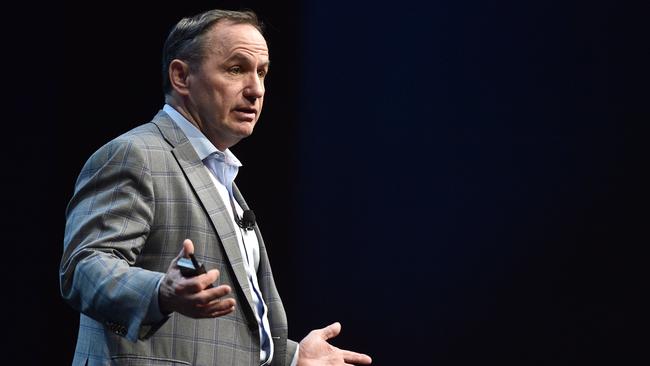
AFP
5.55am: Digital euro could happen ‘within five years’: Lagarde
A digital euro should be a reality within five years, European Central Bank president Christine Lagarde said.
“It’s going to take a good chunk of time to make sure it’s safe,” Lagarde told an online forum organised by Reuters, adding “I would hope that it’s no more than five (years).” “There is a demand” for a digital currency, she added, but that there is a “need to have a system that is secure” and where risks such as hacking are addressed.
“We’re moving on, we are not charging on.” However, “banknotes are here to stay”, Lagarde added.
Lagarde set a similar time frame to China which launched a pilot scheme in 2020 and is edging closer to launching the world’s first sovereign digital currency.
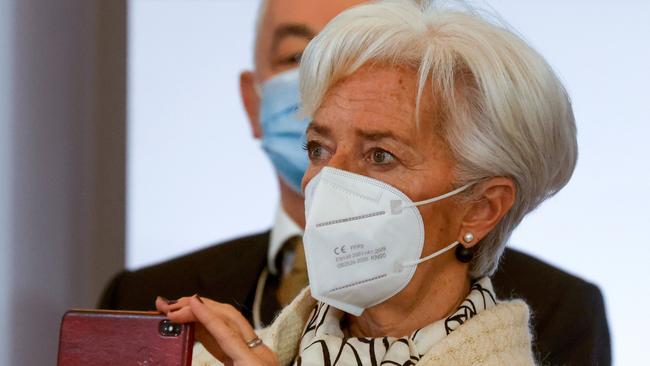
AFP
5.52am: EU clears LSE’s $27bn takeover of Refinitiv
EU regulators authorised the London Stock Exchange’s $US27-billion (22-billion-euro) takeover of US financial data provider Refinitiv on certain conditions.
The transaction is permitted under “commitments that will ensure that the markets will remain open and competitive,” European Union competition commissioner Margrethe Vestager said in a statement.
The merger, announced in August 2019, aims to create a market information giant that would rival Bloomberg.
New York-headquartered Refinitiv is one of the main financial markets data providers, with 40,000 institutional clients in almost all countries on the planet.
It was formerly the financial and risk business of Canadian group Thomson Reuters, which shared ownership with the majority stakeholder, private equity firm Blackstone.
The deal will see the Thomson Reuter-Blackstone consortium take 37 per cent in the London Stock Exchange Group (LSEG) but hold less than 30 per cent of voting rights.
AFP
5.50am: Sales of electric vehicles surge in China
Sales of electric vehicles in China rose 10 per cent last year, data showed Wednesday, amid a post-pandemic economic recovery and a push to establish the world’s largest auto market as a leader for green technology.
Sales of new energy vehicles -- including all-electric and hybrids -- grew 10.9 per cent from a year ago to 1.37 million vehicles in 2020, the China Association of Automobile Manufacturers said.
Total auto sales in China dropped 1.9 per cent to 25.31 million vehicles, but the figure was “better than expected,” the industry association said.
Aggressive lockdowns to contain the COVID-19 virus hit the industry hard in the first quarter of 2020 but sales rebounded as Beijing brought the domestic outbreak under control.

AFP
5.45am: Tech giants hope for US data privacy law
Google, Twitter and Amazon are hopeful that Joe Biden’s incoming administration in the United States will enact a federal digital data law, senior company officials said at CES, the annual electronics and technology show.
“I think the stars are better aligned than ever in the past,” Keith Enright, Google’s chief data privacy office, told a discussion on trust and privacy.
The European Union’s General Data Protection Regulation (GDPR), which has applied since May 2018, has largely contributed to making consumers aware of the issues related to the data that they submit to large digital platforms on a daily basis.
This European data rights charter influenced California, which has now had the California Consumer Privacy Act (CCPA) for over a year.
“That tends to dramatically increase the chances that we can develop the political will at the federal level to do something, just to create a uniform rule of law so that companies know what the rules of the road are and individual users know what their rights and protections are,” Enright said.
Biden’s government will have leeway to legislate, as the Democrats will be in control of the House of Representatives and the Senate.
AFP
5.40am: ECB’s Lagarde confident on outlook
European Central Bank president Christine Lagarde said that she remained confident of the eurozone’s recovery in 2021, despite renewed virus curbs and a challenging start to vaccination programs.
The ECB’s forecasts remain “very clearly plausible”, Lagarde said at an online conference hosted by Reuters, adding she had “no reasons to believe our forecast is wrong at this point in time”.
The ECB in December forecast economic growth in the 19-nation euro area at 3.9 per cent in 2021, after a fall estimated at 7.3 per cent in 2020.
A resurgence in COVID-19 cases has seen several eurozone nations impose tougher coronavirus restrictions, dampening economic expectations at the start of the year, while vaccination rollouts, which Lagarde described as “laborious”, have faced criticism.
AFP




To join the conversation, please log in. Don't have an account? Register
Join the conversation, you are commenting as Logout